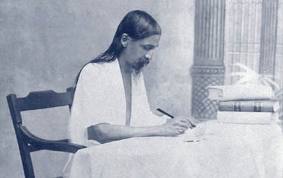
Each month we take a question of this nature and present an answer based on the writings of Sri Aurobindo and the Mother, with the belief that this could be of help to a larger number of persons. We welcome further comments on making our endeavour beneficial to all.
Love for the Divine plays an important part for all seeking after the Divine. But the seeker sometimes wonders whether his love is genuine and true and without any personal motive? Or whether actually there is always a hidden motive, somewhere one wants something from the Divine, even if it is not something material, even if one does not say so to oneself.
A more fundamental question arises:
“Can there at all be an “Ahaituki bhakti” – an entirely motiveless love and devotion for the Divine? Or behind all love and devotion, there is bound to be a hidden motive? Is it wrong to ask the Divine for anything? Can one start with a motive and grow into a motiveless love?”
Here is an excerpt from a very beautiful letter of Sri Aurobindo where he looks at these questions and the deeper truths of Bhakti Yoga, the Yoga of Love and Devotion, in a way which touches both the mind and the heart.
Ahaituki Bhakti
It is understood that whatever the motive immediately pushing the mind or the vital, an asking for Ananda or knowledge or power, yet if there is a true seeking for the Divine in the being, it must lead eventually to the realisation of the Divine. The soul within has always the inherent (ahaituki) yearning for the Divine; the hetu or special motive is simply an impulsion used by it to get the mind and the vital to follow the inner urge.
If the mind and the vital can feel and accept the soul’s sheer love for the Divine for his own sake, then the sadhana gets its full power and many difficulties disappear; but even if they do not, they will get what they seek after in the Divine and through it they will come to realise, even to pass beyond the limit of the original desire.
The Radha Love
I may say that the idea of a joyless God is an absurdity, which only the ignorance of the mind could engender. The Radha love is not based upon any such thing, but means simply that whatever comes on the way to the Divine, pain or joy, milana (union) or viraha (separation), and however long the sufferings may last, the Radha love is unshaken and keeps its faith and certitude pointing fixedly like a star to the supreme object of Love.
Wrong Idea of the Divine
What the Mother told you was that you seemed to have a fixed notion about the Divine, as of a rather distant Being somewhere whom you expect to give you an article called Ananda, and, when there is some prospect of his giving it to you, you are on good terms with him, but when he doesn’t, you quarrel and revolt and call him names! And she said a notion of the kind was in itself an obstacle, because it is rather far from the Truth, in the way of realizing the Divine.
The Divine and the True Ananda
What is this Ananda, that you seek, after all? The mind can see in it nothing but a pleasant psychological condition,—but if it were only that, it could not be the rapture which the bhaktas and the mystics find in it. When the Ananda comes into you, it is the Divine who comes into you; just as when the Peace flows into you, it is the Divine who is invading you, or when you are flooded with Light, it is the flood of the Divine himself that is around you.
Of course, the Divine is something much more, many other things besides, and in them all a Presence, a Being, a Divine Person; for the Divine is Krishna, is Shiva, is the Supreme Mother. But through the Ananda you can perceive the Anandamaya (all-blissful) Krishna; for the Ananda is the subtle body and being of Krishna; through the Peace you can perceive the Shantimaya (all-peaceful) Shiva; in the Light, in the delivering Knowledge, the Love, the fulfilling and uplifting Power you can meet the presence of the Divine Mother.
It is this perception that makes the experiences of the bhaktas and mystics so rapturous and enables them to pass more easily through the nights of anguish and separation; when there is this soul-perception, it gives to even a little or brief Ananda a force or value it could not otherwise have, and the Ananda itself gathers by it a growing power to stay, to return, to increase.
Ask for the Divine Alone
This was what the Mother meant when she said, “Don’t ask the Divine to give you Ananda, ask Him to give you Himself” – signifying that in the Ananda and through the Ananda it would be Himself that He would give you. There would then be no cause to say, “I don’t know the Divine I have never felt or met Him”; it would be a gate for other experiences and make it easier to see the Divine in the material object, in the human form, in the body.
Sri Aurobindo





